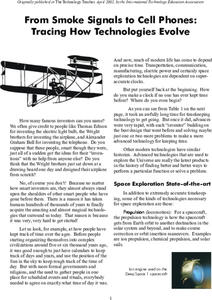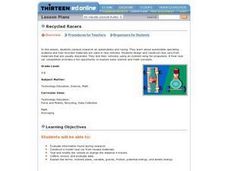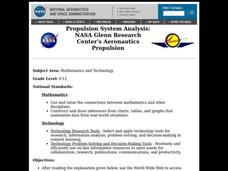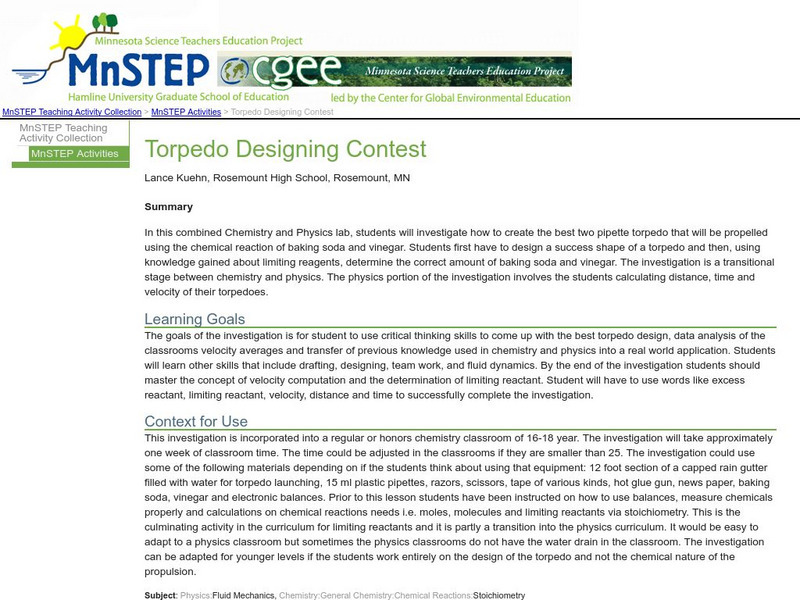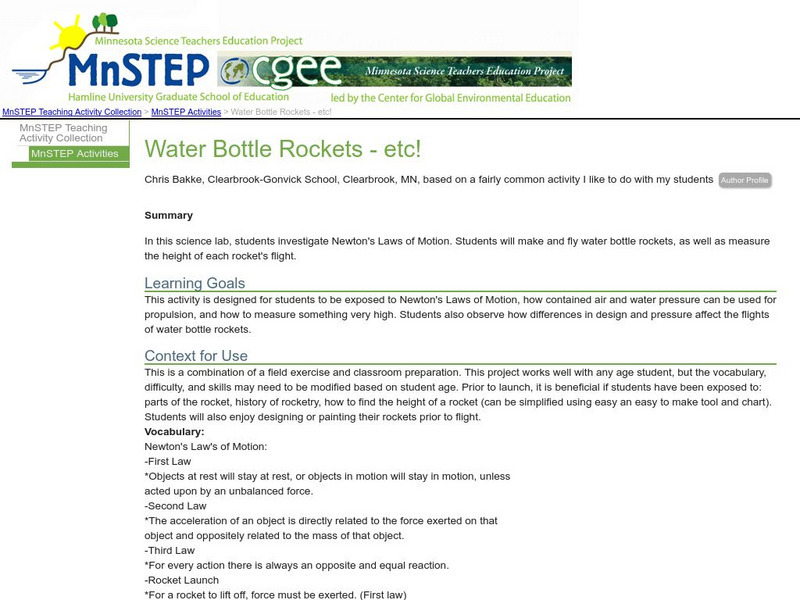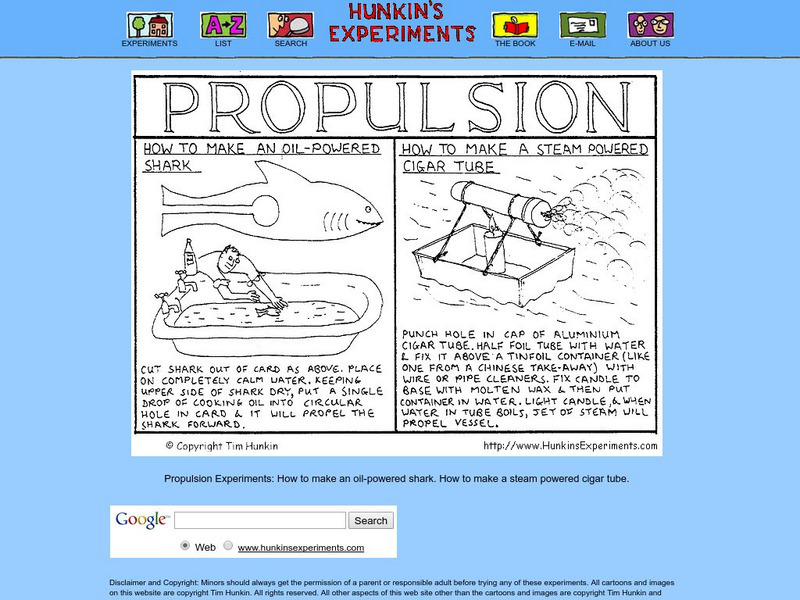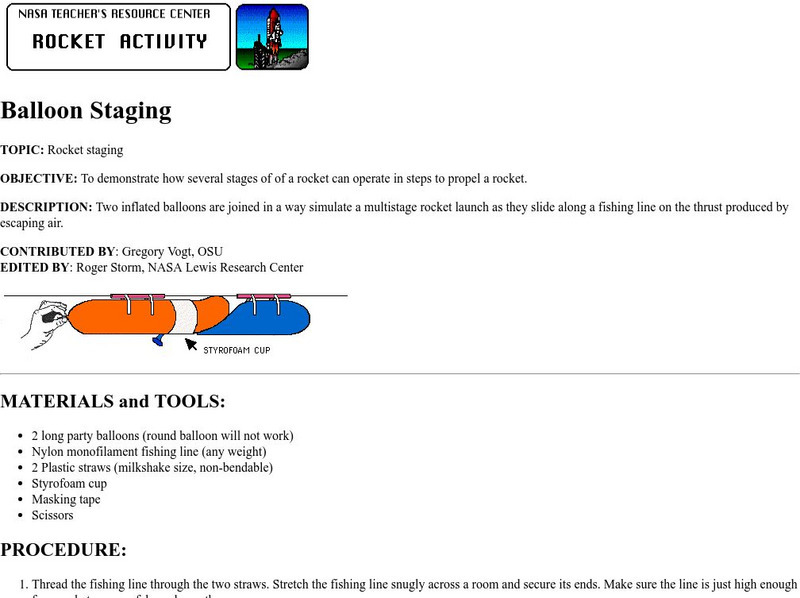Rice University
College Physics for AP® Courses
Take a look at an organized physics course. The 34-section electronic textbook covers material in AP® Physics 1 and 2. Teachers use the text to supplement lectures and have the class work through the labs. Each section contains...
NASA
From Smoke Signals to Cell Phones: Tracing How Technologies Evolve
Explore the science of space exploration. Pupils consider technological advances in propulsion, communication, power, navigation, and imaging. They select one of these areas and create a timeline of historical progress that contributed...
Curated OER
Made to Sail
Students use simple materials to make model sailboats which must stay upright and sail straight in a testing tank.
Curated OER
Labeling Forces Correctly!
Define six common forces: propulsion, air resistance, water resistance, friction, gravity, and upthrust. A picture of a Smart Car is displayed with arrows showing all of the forces acting on it when it is motion. A picture of a rubber...
Curated OER
Rotocopters
Students construct their own rotocopters to study flight. In this flight lesson students work in groups and complete timed trials of their rotocopters.
Curated OER
Alternative Energy Part II - Lesson Eight of Eight - Energy Conversion and Propulsion
Students investigate the results of different propulsion methods. In this propulsion lesson, students measure the distance a test toy car goes using different types of propulsion. They record the distances in data tables before...
Curated OER
Recycled Racers
Students research automobile operating systems in relation to racing. They design and construct vehicles from recycled material which they race to study the concept of propulsion.
Curated OER
Newton Car
Students demonstrate Newton's Second Law of Motion by showing the reaction of a rolling car by increasing its mass and propulsion.
Curated OER
Balloon Rockets
Students build pinwheel airplanes and balloon rockets to determine which ones fly faster and which fly farther.
Curated OER
The Driving Force
Students work in groups and note similarities and differences between their boats: size, shape, color, and unique features. They discuss 3 typical means of propulsion: propellers, sails, and paddles then share their charts with the class.
Curated OER
Aeronautics Propulsion
Students use the World Wide Web to access additional information needed to complete the activities on the forces on an airplane, the function of the stabilizer, and the calculation of Mach speed, temperature, pressure, and thrust.
Science Buddies
Science Buddies: Solid Motor Rocket Propulsion
What does it take to launch a satellite to explore Mars, or a mission to the moon? This project has several possible variations for exploring the physics of rockets. This is rocket science.
NASA
Nasa: Welcome to the Beginner's Guide to Propulsion
What is propulsion and how does it work? This NASA site provides an animated example plus many details related to its use in jet engines.
Other
Spl Swiss Propulsion Laboratory
The Swiss Propulsion Laboratory is a non-profit organization whose primary goal is the development of means of lifting civilian payloads into low-earth orbit at reasonable prices.
Science Education Resource Center at Carleton College
Serc: Torpedo Designing Contest
In this combined Chemistry and Physics lab, students investigate how to create pipette torpedoes that will be propelled using the chemical reaction of baking soda and vinegar.
NASA
Nasa: Glenn Research Center Homepage
NASA's Glenn Research Center "develops advanced technology for high priority national needs - propulsion, power, and communications technologies for application to aeronautics and space."
Science Education Resource Center at Carleton College
Serc: Water Bottle Rockets, Etc!
In this science lab, students investigate Newton's Laws of Motion. They will make and fly water bottle rockets, as well as measure the height of each rocket's flight.
TED Talks
Ted: Ted Ed: Will Future Spacecraft Fit in Our Pockets?
When you picture a rocket, you might imagine a giant ship carrying lots of fuel, people and supplies. But what if the next wave of spacecraft were small enough to fit into our pockets? Dhonam Pemba details the future of microspacecraft,...
Science Bob Pflugfelder
Science Bob: Build a Hovercraft You Can Ride
Science Bob provides instructions for building a hovercraft you can ride using common supplies with tips for using it.
Hunkins Experiments
Hunkin's Experiments: Steam Power
Hunkin's Experiments is a group of simple cartoon illustrations of scientific principles. Some would work well in the classroom, but others have little value beyond entertaining students. All of the projects are easy to do. This one uses...
Michigan Reach Out
Nasa Teacher's Resource Center: Balloon Staging
Activity to show student how rockets reach high altitudes.
Science Bob Pflugfelder
Science Bob: Make Your Own Balloon Rocket!
This site contains a brief procedure for building (and launching) a balloon powered rocket. Introduces concepts of air pressure and propulsion.



